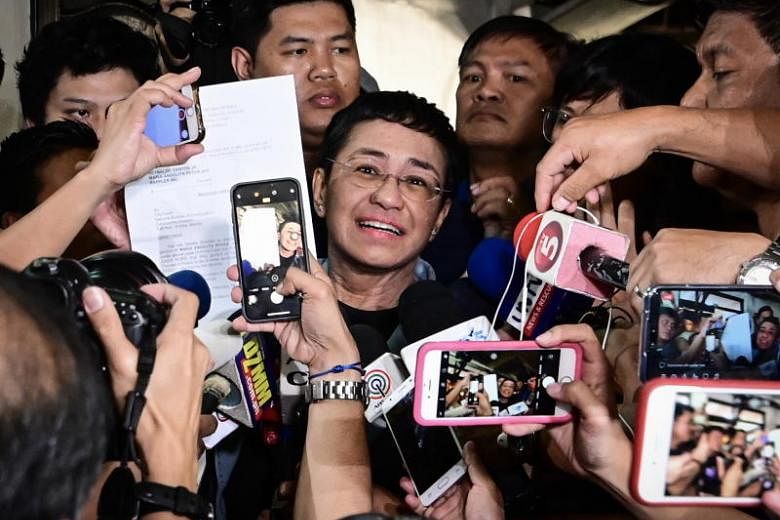MANILA (AFP, REUTERS) - Philippine journalist Maria Ressa was freed on bail on Thursday (Feb 14) following an arrest that sparked international censure and allegations she is being targeted over her news site's criticism of President Rodrigo Duterte.
Ms Ressa, the award-winning head of news platform Rappler, was served a warrant live on television at her office on Wednesday afternoon for what media watchdogs said were trumped-up charges aimed at intimidating journalists who challenge Mr Duterte's rule.
The editor stepped out of a Manila court where she posted bail after spending the night in detention at the National Bureau of Investigation, whose agents arrested her on a "cyber libel" charge that carries a penalty of 12 years behind bars.
"For me it's about two things - abuse of power and weaponisation of the law," Ms Ressa told reporters.
"You have to express outrage and do it now. Press freedom is not just about journalists, is not just about us, it's not just about me, it's not just about Rappler. Press freedom is the foundation of every single right of every Filipino to the truth."
Ms Ressa is accused of cyber libel over a 2012 Rappler article, which was updated in 2014, that linked a Filipino businessman to murder, human trafficking and drug smuggling. Rappler cited information contained in a 2002 intelligence report but did not say which agency compiled it.
The businessman's lawyer says the information was wrong and that the article was defamatory and that he wants to clear his name.
Mr Duterte has made no secret of his annoyance at Rappler and has sparred frequently with its reporters, who are known for scrutinising his polices and questioning the accuracy of his sweeping, often bellicose statements.
Such scrutiny has seen Mr Duterte's detractors engulfed by tides of online anger.
CRITICISM DISCOURAGED
Rappler's reporting has accused his administration of creating a social media "ecosystem" designed to defend Duterte, threaten and discredit his opponents, and discourage Filipinos from criticising him for fear of being attacked by online trolls.
The government denies the accusations.
Mr Duterte once suggested Rappler was American-owned and could therefore be linked to the US Central Intelligence Agency. He called Rappler a "fake news outlet" and banned a reporter from covering his events.
Rappler, founded in 2010, is no stranger to legal challenges and faces ongoing cases over tax evasion and alleged ownership violations. It denies wrongdoing and says it will not be cowed into self-censorship.
This was the first time Ms Ressa was arrested, although she said her release marked the sixth time she had been charged and granted bail.
However, Mr Duterte's spokesman, Mr Salvador Panelo, said the libel case had nothing to do with the government and that Mr Duterte had no interest in punishing journalists who challenged him.
"That's absolutely unrelated. The President has been criticised and he does not bother," Mr Panelo told DZMM radio.
Ms Ressa had been unable to post bail because the court was closed. She says she has been released on bail five times in the past.
Mr Francis Lim, a Rappler legal counsel, said the libel case was suddenly revived after it had originally been dismissed for lacking merit.
"It means that the law can be twisted by the powers as a weapon against journalists who expose their wrongdoing to the public," Mr Lim said in a text message.
Ms Ressa's detention was criticised by journalists and activists at home and abroad. Former US secretary of state Madeleine Albright said it was an "outrageous" arrest that "must be condemned by all democratic nations".
London-based Amnesty International said Mr Duterte's administration was using the law to "relentlessly intimidate and harass journalists". Mr Dabet Panelo of the National Union of Journalists of the Philippines said it would backfire and called for protests on Friday.
CRITICISM DISCOURAGED
Rappler's reporting has accused his administration of creating a social media "ecosystem" designed to defend Duterte, threaten and discredit his opponents, and discourage Filipinos from criticising him for fear of being attacked by online trolls.
The government denies the accusations.
Duterte once suggested Rappler was American-owned and could therefore be linked to the US Central Intelligence Agency. He called Rappler a "fake news outlet" and banned a reporter from covering his events.
Rappler, founded in 2010, is no stranger to legal challenges and faces ongoing cases over tax evasion and alleged ownership violations. It denies wrongdoing and says it will not be cowed into self-censorship.
This was the first time Ressa was arrested, although she said her release marked the sixth time she had been charged and granted bail.

